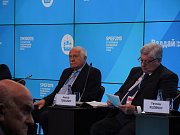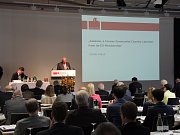Nejnovější
Nejčtenější
Hlavní strana » English Pages
A Short (and Very Selective) Outline of Recent Relevant World Events
English Pages, 22. 8. 2015
I have to start by mentioning that this day, the 21st August, is a very sad and distressing day for my country. Forty-seven years ago, the Warsaw Pact armies – led by the Soviet Union – invaded Czechoslovakia with the objective to crush the very promising development there, called – somewhat imprecisely – Prague Spring. Due to it, we had to wait for the coming of freedom for another two decades, till November 1989.
First Five Years since the Outbreak of the Greek Crisis
English Pages, 28. 6. 2015
 In the five years that just passed, we have been the witnesses of the Greek debt crisis but it is evident that its symptoms were growing well before May 2010. This country has experienced financial crises and serious budgetary problems many times in the past.
In the five years that just passed, we have been the witnesses of the Greek debt crisis but it is evident that its symptoms were growing well before May 2010. This country has experienced financial crises and serious budgetary problems many times in the past.
St. Petersburg´s Comments
English Pages, 19. 6. 2015
 1. Thank you for the invitation both to the St. Petersburg International Economic Forum and, specifically to the Valdai Discussion Club Session. I have promised to come to Valdai several times in the past but I had not fulfilled that promise. I hope my presence here today will be considered at least a small substitute for it.
1. Thank you for the invitation both to the St. Petersburg International Economic Forum and, specifically to the Valdai Discussion Club Session. I have promised to come to Valdai several times in the past but I had not fulfilled that promise. I hope my presence here today will be considered at least a small substitute for it.
Vaduz Speech: Lessons, a Former Communist Country Learned from Its EU Membership or Was It Vice Versa?
English Pages, 29. 5. 2015
 Thank you for the invitation to visit again this beautiful place. Thank you for giving me an opportunity to attend the XI. Gottfried von Haberler conference and to address this distinguished audience, especially His Serene Highness Prince Alois.
Thank you for the invitation to visit again this beautiful place. Thank you for giving me an opportunity to attend the XI. Gottfried von Haberler conference and to address this distinguished audience, especially His Serene Highness Prince Alois.
I would like, first, to explain the title of my today´s speech as it was introduced in the program of the conference.
UBS Gala Dinner Speech
English Pages, 10. 5. 2015
Mr. Chairman, Ladies and Gentlemen,
Thank you for inviting me to be with you this evening, thank you for choosing Prague for your annual gathering and thank you for organizing your gala dinner at the Prague Castle. I was very privileged to spend ten years here, in this beautiful place, in this unique complex of historic buildings.
Notes for a Speech in Baku to the Russia-West Relations
English Pages, 29. 4. 2015
Thank you for inviting me to attend the 3rd Baku Forum and for including me in this panel. I find its topic highly relevant. With the exception of the present Middle East problem, so vividly demonstrated by the sudden appearance of the Islamic state and all its atrocities, the deteriorating West-East or, perhaps, Western Europe and America and Russia relations represent the most dangerous development we are confronted with just now, especially we in Central and Eastern Europe.
The Visible Defects of the Ideology of Universalism
English Pages, 13. 4. 2015
 Many thanks for the invitation to this important gathering and for including me in the presidential panel of – as you put it – “sagacious men”. This adjective is – at least as regards myself – an evident overstatement. Moreover, in the “brave new world” of European political correctness it would be considered wrong to speak about men only.
Many thanks for the invitation to this important gathering and for including me in the presidential panel of – as you put it – “sagacious men”. This adjective is – at least as regards myself – an evident overstatement. Moreover, in the “brave new world” of European political correctness it would be considered wrong to speak about men only.
Milano Speech: Looking at Europe and Its Stagnating Economy from Prague
English Pages, 13. 3. 2015
 Thank you for the invitation and for giving me an opportunity to address this distinguished audience.
Thank you for the invitation and for giving me an opportunity to address this distinguished audience.
My last speech in this historic city was six years ago when I was presenting the Italian version of my book devoted to the economic critique of the global warming doctrine. I challenged in it the very shaky economic foundations of this mistakenly considered non-economic, non-social science doctrine.
Václav Klaus: Interview for Global Gold
English Pages, 25. 2. 2015
 Mr. Klaus it’s a great honor and pleasure to be here and have this opportunity to interview one of the key shapers of the Czech Republic as it is today. The first time I actually saw you speak in person was at the “Gottfried von Haberler-Conference” last year, where you rightfully criticized a Canadian politician or diplomat after his speech due to his strong pro-government arguments, which you disproved using classical liberal arguments.
Mr. Klaus it’s a great honor and pleasure to be here and have this opportunity to interview one of the key shapers of the Czech Republic as it is today. The first time I actually saw you speak in person was at the “Gottfried von Haberler-Conference” last year, where you rightfully criticized a Canadian politician or diplomat after his speech due to his strong pro-government arguments, which you disproved using classical liberal arguments.
Introduction to the Fraser Institute's book „The Essential Hayek“
English Pages, 17. 2. 2015

Those of us born in the 20th century—the century of two destructive world wars and two equally ruinous periods of Nazism and Communism—particularly those of us born during the Second World War and who spent four decades under Communism, who to understand what was going on, and who eventually had the courage to try to change it, had always been looking for a compass that would make possible some elementary orientation in life.
- hlavní stránka
- životopis
- tisková sdělení
- fotogalerie
- Články a eseje
- Ekonomické texty
- Projevy a vystoupení
- Rozhovory
- Dokumenty
- Co Klaus neřekl
- Excerpta z četby
- Jinýma očima
- Komentáře IVK
- zajímavé odkazy
- English Pages
- Deutsche Seiten
- Pagine Italiane
- Pages Françaises
- Русский Сайт
- Polskie Strony
- kalendář
- knihy
- RSS
Copyright © 2010, Václav Klaus. Všechna práva vyhrazena. Bez předchozího písemného souhlasu není dovoleno další publikování, distribuce nebo tisk materiálů zveřejněných na tomto serveru.
















